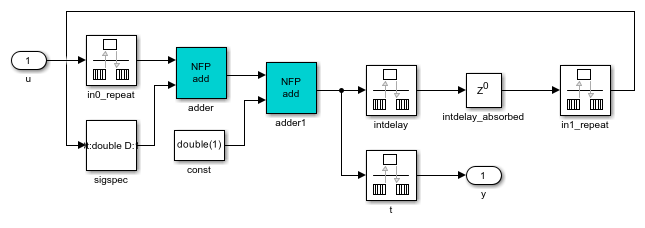Optimize Feedback Loop Design and Maintain High Data Precision for HDL Code Generation
Optimize a feedback loop design and maintain high data precision for HDL code generation by using native floating point and clock-rate pipelining when generating HDL code from a MATLAB® design.
Open the MATLAB Code
The MATLAB function feedback_fcn describes a feedback loop that keeps track of the previous state value and adds it to the current value.
open('feedback_fcn')
function y = feedback_fcn(u) persistent state; if isempty(state) state = 0; end y = u + state + 1; state = y;
Create HDL Code Generation Configuration Object and Apply Clock-Rate Pipelining
The variable state is a persistent variable. In HDL code generation, persistent variables act as delays and map to a register. As a result, persistent variables introduce latency in the feedback loop. To compensate for this latency in the generated HDL code, you can use clock-rate pipelining. For more information on clock-rate pipelining, see Clock-Rate Pipelining.
To programmatically apply clock-rate pipelining, first create a coder.HDLConfig object.
hdlcfg = coder.config('hdl');
Set the DesignFunctionName property to the MATLAB function and the TestBenchName property to the test bench script, feedback_fcn_tb.
hdlcfg.DesignFunctionName = 'feedback_fcn'; hdlcfg.TestBenchName = 'feedback_fcn_tb';
Enable GenerateHDLTestBench to generate HDL test bench code from feedback_fcn_tb.
hdlcfg.GenerateHDLTestBench = true;
Enable clock-rate pipelining and set an oversampling factor based on the amount of latency introduced in the design. In this example, the design requires a 22x faster clock than the base rate. Set the oversampling factor to 22.
hdlcfg.ClockRatePipelining = true; hdlcfg.Oversampling = 22;
Use Native Floating Point for HDL Code Generation
The test bench function feedback_fcn_tb uses the double data type as the input to feedback_fcn.
open('feedback_fcn_tb')
for ii = 1:10 y = feedback_fcn(ii); end
Using a double data type as the input for HDL code generation produces non-synthesizable code unless you either convert the input to fixed-point or use native floating point. To maintain high data precision, use native floating point. The tradeoff is that more hardware resources are needed to store floating-point values than fixed-point values.
To enable native floating point, first enable the AggressiveDataflowConversion property. This property transforms the control flow algorithm of the MATLAB code inside the MATLAB function to a dataflow representation, which native floating point uses.
hdlcfg.AggressiveDataflowConversion = true;
Use native floating point for HDL code generation by setting the FloatingPointLibrary property to NativeFloatingPoint. To produce an error during HDL code generation if there is any real type in the HDL code, you can set the diagnostic option TreatRealsInGeneratedCodeAs to Error. By default, the option TreatRealsInGeneratedCodeAs is set to Error.
hdlcfg.FloatingPointLibrary = 'NativeFloatingPoint';
hdlcfg.TreatRealsInGeneratedCodeAs
ans =
'Error'
Generate a Simulink® model that contains Simulink blocks that is functionally equivalent to your MATLAB function design. The Simulink model performs the algorithm designed in your MATLAB function. This property requires a Simulink license.
hdlcfg.GenerateMLFcnBlock = true;
Generate HDL Code
Generate HDL code with an HDL code generation report by using the codegen function.
codegen -report -config hdlcfg
### Begin MATLAB to HDL Code Generation...
### Working on DUT: feedback_fcn.
### Using TestBench: feedback_fcn_tb.
### Generating new model: '<a href="matlab:open_system('gm_feedback_fcn')">gm_feedback_fcn</a>'.
### Begin model generation 'gm_feedback_fcn'...
### Rendering DUT with optimization related changes (IO, Area, Pipelining)...
### Model generation complete.
### The DUT requires an initial pipeline setup latency. Each output port experiences these additional delays.
### Output port 1: 1 cycles.
### MESSAGE: The design requires 22 times faster clock with respect to the base rate = 1.
### Working on feedback_fcn_tc as /tmp/Bdoc25b_2988451_700845/tp872733f4/hdlcoder-ex54382413/codegen/feedback_fcn/hdlsrc/feedback_fcn_tc.vhd.
### Begin VHDL Code Generation
### Working on feedback_fcn/nfp_add_double as <a href="matlab:edit('/tmp/Bdoc25b_2988451_700845/tp872733f4/hdlcoder-ex54382413/codegen/feedback_fcn/hdlsrc/nfp_add_double.vhd')">nfp_add_double.vhd</a>.
### Working on feedback_fcn_enb_bypass as <a href="matlab:edit('/tmp/Bdoc25b_2988451_700845/tp872733f4/hdlcoder-ex54382413/codegen/feedback_fcn/hdlsrc/feedback_fcn_enb_bypass.vhd')">feedback_fcn_enb_bypass.vhd</a>.
### Working on feedback_fcn as <a href="matlab:edit('/tmp/Bdoc25b_2988451_700845/tp872733f4/hdlcoder-ex54382413/codegen/feedback_fcn/hdlsrc/feedback_fcn.vhd')">feedback_fcn.vhd</a>.
### Generating package file <a href="matlab:edit('/tmp/Bdoc25b_2988451_700845/tp872733f4/hdlcoder-ex54382413/codegen/feedback_fcn/hdlsrc/feedback_fcn_pkg.vhd')">feedback_fcn_pkg.vhd</a>.
### Generating Resource Utilization Report <a href="matlab:hdlcoder.report.openDdg('/tmp/Bdoc25b_2988451_700845/tp872733f4/hdlcoder-ex54382413/codegen/feedback_fcn/hdlsrc/resource_report.html')">resource_report.html</a>.
### Generating Optimization report
### To rerun codegen evaluate the following commands...
---------------------
cgi = load('/tmp/Bdoc25b_2988451_700845/tp872733f4/hdlcoder-ex54382413/codegen/feedback_fcn/hdlsrc/codegen_info.mat');
inVals = cgi.CodeGenInfo.inVals;
cfg = cgi.CodeGenInfo.codegenSettings;
codegen -config cfg -args inVals -report
---------------------
### Begin TestBench generation.
Code generation successful.
### Accounting for latency of output port : 1 cycles.
### Collecting data...
### Begin HDL test bench file generation with logged samples
### Generating test bench data file: /tmp/Bdoc25b_2988451_700845/tp872733f4/hdlcoder-ex54382413/codegen/feedback_fcn/hdlsrc/u.dat.
### Generating test bench data file: /tmp/Bdoc25b_2988451_700845/tp872733f4/hdlcoder-ex54382413/codegen/feedback_fcn/hdlsrc/y_expected.dat.
### Working on feedback_fcn_tb as /tmp/Bdoc25b_2988451_700845/tp872733f4/hdlcoder-ex54382413/codegen/feedback_fcn/hdlsrc/feedback_fcn_tb.vhd.
### Generating package file /tmp/Bdoc25b_2988451_700845/tp872733f4/hdlcoder-ex54382413/codegen/feedback_fcn/hdlsrc/feedback_fcn_tb_pkg.vhd.
### Generating HDL Conformance Report <a href="matlab:web('/tmp/Bdoc25b_2988451_700845/tp872733f4/hdlcoder-ex54382413/codegen/feedback_fcn/hdlsrc/feedback_fcn_hdl_conformance_report.html')">feedback_fcn_hdl_conformance_report.html</a>.
### HDL Conformance check complete with 0 errors, 0 warnings, and 1 messages.
### Code generation successful: To view the report, open('codegen/feedback_fcn/hdlsrc/html/report.mldatx')
